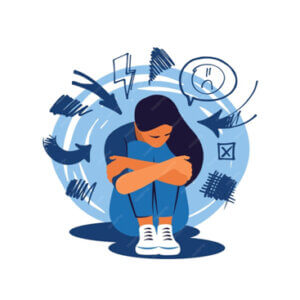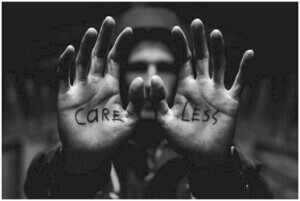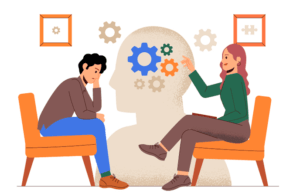Anxiety Disorder: How to deal with it!
Why is it that some people heal their anxiety disorder by themselves, while some don’t? Because the rest of us, create conflicts in our minds by avoiding the realities of life. Our emotions often get the best of us. It is okay to be out of our daily rhythm sometimes. Panicking does not provide us with better options. Missing out on the tiniest bits of our lives shouldn’t be a reason to set our hearts pounding. In this article, we will explore everything that one should know about anxiety disorder. Furthermore, we have brought you 7 simple tips as to how to deal with anxiety.
- Part 1. What is Anxiety Disorder?
- Part 1.1 Generalized Anxiety Disorder (GAD)
- Part 1.2 Social Anxiety Disorder (SAD)
- Part 1.3 Panic Disorder
- Part 2. Signs of Anxiety Disorder
- Part 3. How to Deal with Anxiety Disorder?
- Part 3.1 Tear off the anxiety label
- Part 3.2 . Care a little less
- Part 3.3 Have a morning routine
- Part 3.4 Turn your obstacles into opportunities
- Part 3.5 Take Social Support
- Part 3.6 MedicationsTake Social Support
- Part 3.7 CBT Cognitive Behavioral Therapy
- Part 4. Strategies to Manage Anxiety
What is Anxiety Disorder?
Anxiety disorder is not merely a heightened sense of worry or stress; it’s a distinct and diagnosable condition. According to the World Health Organization, more than 300 million are affected with anxiety disorders. Hence, understanding, managing, and treating anxiety disorder is vital to lead a happier life. Whether you’re going through some negative life events, a trauma, or feeling low-esteem, just remember that you’re sufficient in your form.
Let’s learn what exactly its main prevalent forms are:
1. Generalized Anxiety Disorder (GAD):
Generalized Anxiety Disorder is illustrated by excessive and unmanageable worry about various aspects of life, such as health, work, family, or financial concerns. Individuals with GAD often find it challenging to control their anxiety and may worry excessively about unlikely events.
2. Social Anxiety Disorder (SAD):
Social Anxiety Disorder, also known as social phobia, concerns an extreme fear of social situations or scrutiny by others. People with SAD may avoid social interactions, fearing judgment or embarrassment.
3. Panic Disorder:
Panic Disorder is marked by repeated and frequent panic attacks that are sudden and intense. Also, it is accompanied by physical symptoms such as heart pulsations, sweating, and a sense of impending doom. These attacks can lead to ongoing fear of future panic episodes.

Signs of Anxiety Disorder
Understanding anxiety disorders begins with recognizing their symptoms. The signs and symptoms visible with anxiety disorders can be:
- Common signs like excessive worry and restlessness
- Irritated from most things and life happenings
- Muscle tensions
- Difficulty concentrating
- Frequent rapid heartbeat
- Shortness of breath
- Sleep disturbances or unable to sleep though you’re tired
- Sweaty or tingling of hands or feet
- You’re persistently thinking about a problem

How to Deal with Anxiety Disorder?
Professional diagnosis is essential to determine whether an individual is experiencing an anxiety disorder. Mental health professionals assess symptoms, duration, and impact on daily life to make an accurate diagnosis. Remember, early intervention is crucial to prevent further escalation of symptoms. Here’s how you can deal with the anxiety disorders:
3.1 Tear off the anxiety label:
People agonizing with anxiety disorder go through an emotional time in their life. But more often, some of us take it to be their identity. These labels lower the chances of healing. We use all sorts of acronyms for the anxiety symptoms. Try not to hide behind the labels. Feel everything but go ahead and question your emotions logically. Questions lead you to causes and causes lead you to results.

3.2 Care a little less:
Accept the pain in your life but do not be swayed by it. Get on with your day and be detached from worries that hardly matter. Detachment teaches us to go on. Care a little less if your friends are having ‘the time of their life’ or if your colleagues are getting that ‘promotion’ which you much deserved. If we care too much, we only stare at our own ditch at the end. By detachment, we only mean taking care of our own emotions and not adding more imagination to the suffering we go through in reality.

3.3 Have a morning routine:
Our mornings often predict the rest of our day. A bad morning = a bad day. Wake up energized! You could start by working on simple chores such as waking up early, making your bed, making yourself breakfast, and taking a shower. Take one day at a time and start afresh each day. Stop feeling as tired as you were when you went to bed the previous night. Once you start your day with a positive vibe, you will lower your anxiety and learn to see the beauty of your life.

3.4 Turn your obstacles into opportunities:
Think like the Roman Emperor, Marcus Aurelius! A worthwhile life requires more sacrifices. We have to expose ourselves to difficulties to achieve greatness. It is always better to cultivate a skill to solve our problems rather than reacting to the problems. So, do not let inevitable feelings creep into your heart and life.

3.5 Take Social Support
Social support and Therapy are crucial components of managing anxiety disorders:
- Support from Friends and Family: Understanding and empathetic friends and family can provide a robust support system.
- Support Groups: Joining support groups where individuals share similar experiences can help individuals feel less isolated.

3.6 Medications
In most cases, your healthcare professionals may prescribe medication as part of an anxiety disorder treatment. However, medication is typically considered when other treatments have not been effective or in severe cases.

3.7 CBT Cognitive Behavioral Therapy
Cognitive-behavioral therapy is a widely operated therapeutic technique for anxiety disorders. It helps individuals identify and challenge irrational thoughts and beliefs, replacing them with healthier thought patterns. CBT equips individuals with coping strategies to manage anxiety effectively.

Strategies to Manage Anxiety
Managing anxiety disorders involves a multifaceted approach, including lifestyle changes, therapy, and sometimes medication. Here are some effective strategies:
- Balanced Diet: A diet rich in nutrients can help stabilize mood. Avoid excessive intake of caffeine and alcohol, as they can worsen anxiety.
- Regular Exercise: Physical activity releases endorphins, which improve mood and reduce anxiety.
- Adequate Sleep: Prioritize sleep, aiming for 7-9 hours per night. Lack of sleep can aggravate anxiety symptoms.
- Mindfulness Practices: Techniques like meditation, deep breathing, and yoga can help relax the mind and reduce anxiety.

Conclusion
In the words of Marcus Aurelius” Today I escaped anxiety. Or no, I discarded it, because it was within me, in my own perceptions — not outside.”
We hope you grow your relationships, energy, and productivity, and fight anxiety disorder. Everything runs exactly as it should with a few pebbles on the way. Put your negative thoughts in perspective. Is it really as bad as you think?
